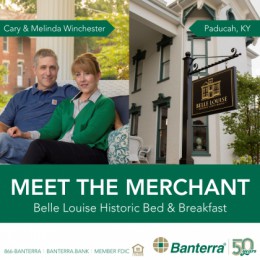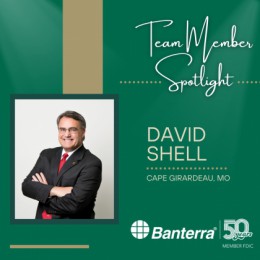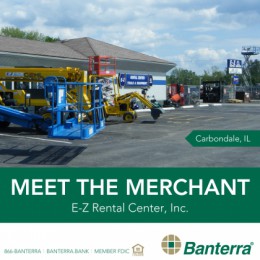Introducing "Helping You Thrive," A Banterra Bank Podcast
Banterra Bank is excited to announce the launch of its new podcast, "Helping You Thrive," as part of the celebration of our 50th anniversary. This podcast was created to empower individuals, businesses, and communities with financial tips, inspiring stories, and expert insights that pave the way to success. As a leading community bank rooted in Southern Illinois and expanding across the Western United States, Banterra has consistently prioritized growth and economic prosperity for its customers.
Hear from seasoned banking experts, insightful business owners, and influential community leaders as they offer practical advice and share real-life stories to help you achieve your financial goals. Whether you’re searching for smart financing tips, entrepreneurial inspiration, or community insights, "Helping You Thrive" is your go-to resource in the journey to success.
Tune in to "Helping You Thrive" on Spotify, Apple Podcasts, and Banterra's YouTube Channel by searching @banterrabanks or "Helping You Thrive." Subscribe and thrive today!
Helping You Thrive Podcast - Episode One Transcript
00:00:04 Jennifer Spence
Welcome to Helping You Thrive a Banterra Bank Podcast, which offers inspiration and information to help individuals, businesses, and communities to thrive. I'm Jennifer Spence, Director of Marketing for Banterra Bank, and I'm one of your co-hosts.
00:00:15 Ben Craft
And I'm Ben craft, Commercial Officer at Banterra Bank, and also a co-host. This is our first podcast of Helping You Thrive, something we are kicking off as part of Banterra’s 50th anniversary celebration. We plan on providing a podcast each month.
00:00:27 Jennifer
Obviously, the best way to start a celebration is to hear from our President and CEO, Jeff May, regarding the journey of Banterra. We plan to discuss how we started, how we've grown, what has made our company successful, and what impact we have made. We will also be looking at the next 50 years of Banterra and banking as a whole. Welcome Jeff.
00:00:45 Jeff May
Good morning. Glad to be here.
00:00:48 Ben
So, Jeff, I think I'm really going to enjoy this because I'm used to being in loan committee and having to answer questions from you. Now I get to turn the tables a little bit and Jennifer told me that I have complete immunity. I can ask anything I want.
00:01:03 Jeff
I'm not sure that's true but go ahead.
00:01:06 Ben
Alright, alright. We’ll see but before we get into Banterra’s story, Jeff, can you just share a little bit about your background and what led you to Banterra?
00:01:12 Jeff
OK, well that’s a long time ago that this all started. Back in 1977, when I was graduating high school, I got pulled out of class to think about and was asked to work part-time as an evening bank teller at a little bank called First Community Bank. At that time, Don Nolan, most people around Marion know was the President of the bank. So, I said sure I wasn't going into banking - I think I was looking at engineering at the time, but after a while of working the bank said I'm going to change my major, so I did. I went on to Eastern Illinois from John A. and I was at the dorm and got a call from the FDIC, they asked me to interview for an internship job which I did. Became an intern for the FDIC my senior college, which led to a full time FDIC job starting back in 1980 – 1981. And I worked for the FDIC until 2002 and from 1990 to 2002, I was the field supervisor for Southern Illinois or downstate Illinois and Banterra Bank was in my Portfolio of banks. I knew the folks at Banterra very, very well. And that year in 2002, the FDIC decided they needed me to be in Chicago more than they need me in Marion, IL. And so, two weeks later, I was working for Banterra and that's how it all started.
00:02:28 Jennifer
Well, we're so glad that you stayed in Southern Illinois. You know, I don't know how many other banks have a President and CEO that has more than 20 years’ experience as a supervisor with the FDIC and I think it’s sort of a great strength for the bank to have and also our Chief Banking Officer, Kristina Scott has a similar experience, doesn't she?
00:02:46 Jeff
She does. A matter of fact, I hired her out of college with the FDIC and about 2-3 years ago I was looking for a Chief Banking Officer and ran into Kristina again. She made a great candidate. You got to realize it was 10 years’ experience with FDIC and she's been in probably 100 or more banks.
00:03:02 Jennifer
Oh wow.
00:03:03 Jeff
And that varied experience of all these different banks across the country is invaluable running a bank. And so, she brought that skill set with her and is using it very well.
00:03:13 Ben
So, we know that Banterra started as a small bank in Ridgway, affectionately known as the popcorn capital of the world. Right? In 1975, formerly the Gallatin County state. So can you share a little bit about the origin story of Banterra and how it began.
00:03:27 Jeff
Well, I was in high school back then but…
00:03:31 Jennifer
We won't tell you what Ben was doing then.
00:03:34 Jeff
It was a small ag bank. I think it had some challenges. Our Chairman Everett Knight saw an opportunity to purchase the bank. He was already active in baking. It wasn't far from his hometown of Rosiclare. And so, him, with some investors bought the bank during that time frame.
00:03:51 Jennifer
For perspective for listeners, Ridgway's population at the time, other than being the popcorn capital of the world, only had 1200 people and our bank started with $11 million in assets. I personally love this underdog story when it comes to where Banterra started and where it is today. So let's just sort of put a pin in that as we learn more about our bank. Jeff, talk to us about the next growth step that happened in 1979, and you sort of already mentioned that personal connection with West Frankfort.
00:04:19 Jeff
Correct. In 1979, Banterra became a multi-bank holding company. One of the first with the purchase of West Frankfort. Banterra later purchased the bank I worked for and merged into their West Frankfort branch. West Frankfort, still our largest - one of our largest - one of our busiest locations in the in the bank. One of our other original founders, Tom Raben, lived in that town for a while and he’s still with the bank.
Jennifer
One of our board members, correct?
00:04:44 Jeff
Board members correct.
00:04:46 Jennifer
I actually like that Don still involved too.
00:04:48 Jeff
Yes.
00:04:49 Ben
Yeah. Well, I tell you, Don - his office is next to mine in Marion. I get to see him on a regular basis and he's invaluable. I check in with him. We talk about things that are going on. I might pop in and ask him about a deal I'm working on and ask his opinion. It’s just great to have him around and all of his experience going back for years and years. It's great. So, looking back at the history after West Frankfort, Banterra really started to gain momentum. Acquired banks throughout the region. I know you didn't start until 2002, but can you speak to the rapid growth that our bank has had in southern Illinois? Maybe speak to the growth and momentum that started to pick up.
00:05:28 Jeff
Sure. And actually, I was around and was examining Banterra back in this growth period mainly was through acquisitions in the 1980s. They bought banks and Christopher, Marion, Norris City, Vienna, McLeansboro. And there was opportunities in the 80s because the economy was struggling, both ag and oil was having problems and that created opportunities for Banterra to acquire other banks. And of course, after that we started doing some branches like in Paducah, Carbondale, Eldorado. We also did our in-store branch in Kroger, which is one of the first in the area and I think probably maybe the only one in the area by a local bank. Everett Knight, our chairman ever, knew the bank had to grow and the bank aggressively tried to grow and look for opportunities to grow through all through the 80s and 90s. We still are looking today.
Jennifer
You know, even if we just ended the story here, that's such an inspiring story on a Southern Illinois company, a bank in this case started in a small town and then eventually had 12 locations so quickly and then 13 if you count Paducah in 1996. So, I mean, I know part of that was acquisition, but what else do you think was really the reason why that rapid growth?
00:06:38 Jeff
Well, I got to observe that from the outside, obviously in my other role with the FDIC, but clearly Banterra had strong leadership. They were very innovative, and they were highly motivated, and they were committed to their communities and the markets they serve, you know, I realized Banterra was one of the first multi bank holding companies in the state. Banterra was one of the first banks to Interstate Bank, which means we went to Paducah, but that time is very difficult and there are laws are very difficult to do it with. We had to buy the Bank of Vienna, then Charter and then branch into Kentucky, and then convert it back to a branch. The laws are much different then, but that was very innovative. Of course, we were very focused on agriculture, still are. Obviously, we started as an agriculture bank. It's still a big part of our business model and of course, Southern Illinois has a very large agricultural economy that drove the bank. But as a whole, the bank has always been focused on customer quality and customer service. And that's been the - added to the bank from the very beginning has drove everything the bank has done.
00:07:43 Ben
Ok, so it's 2002. You just start with Banterra. Completely unrelated I'm sure, but we hit a billion dollars in assets in 2003.
00:07:53 Jeff
Well, the bank had just purchased some branches from Fifth-Third in 2002, which drove some of that growth.
00:08:00 Ben
That helps. And so, we enter, you mentioned Kentucky, but we entered Indiana in 2005; Missouri markets, Specialty Lending division started in 2007. All within five years of your start date. We're really entering the expansion phase. So, can you tell us a little bit about that and why this growth was critical?
00:08:19 Jeff
Actually, my first assignment at Banterra was to one, reorganize the bank and two, find new markets. Evansville was the first market that I identified from a metrics perspective that I thought was under bank but had a strong economy and it was continuous suit of the bank so would be easy to branch into that marketplace. We've been very fortunate to find a really strong team there and good leadership in that market and nowadays we're a very well-known brand in Evansville and we've grown to be the 6th largest bank in that community, and it's helped us. We have about 300 million assets in that market now. Then later, we moved a branch into Cape. We had an opportunity to hire some strong leadership out of the Cape Market. That's been a very good market for us. We have a very good team down there, probably the biggest challenge we had to grow was we went, we got into RV lending, indirect RV lending which we buy loans from dealers throughout the nation. So as a national program, it's not common for a community bank to be in that business model and it's a very different mindset. So, I think I spent almost a year, maybe more than a year, vetting that business model with other banks, particularly large banks like B of A and US bank. And we decided to enter that business after we understood it. We had to communicate with our regulars, so they understood it too, but it's been a great success for us, without a doubt.
00:09:41 Jennifer
Yeah, you've got a great team on that too. You know, I started at Banterra in 2012 and I, you know, what I knew about Banterra was it had a lot of branches, and it had community support. I had no idea about the specially lending division, and I don't think most people do. You know you touched on RV & Marine but now we've got Machine Tool Finance and Aircraft Finance. I mean, you can buy a plane at Banterra. You know?
00:10:02 Jeff
You better have a license though.
00:10:04 Jennifer
Yeah, that's true. I don't want it but anyways, I just think that's something that's not very well known.
00:10:09 Jeff
We did this to diversify the bank’s loan portfolio and to grow the bank. One of the things in lending you do want you don't want to be concentrated in two of the same type of loans or same area geographically. So that was a diversification move and a growth move. It also enables us as we grew these specialty markets. It enabled us to grow our support staff locally. We've grown our support staffs in Marion and Eldorado significantly because of the growth nationally and these specialty units. Of course, with that we're able to do more things to support our community, more sponsorships, more charities. All that from growing the bank and the special units allowed us to grow the bank significantly.
00:10:47 Ben
So that portfolio diversification you mentioned geographic expansion as well. So, I think the Machine Tool Department led us to expanding into the western part of the country, right? Can you speak a little about that.
00:11:00 Jeff
In part it did.
00:11:02 Ben
Among other things.
00:11:06 Jeff
We've been with Machine Tool since 2009, but we opened a loan production office of Machine Tool in Tempe, AZ, in 2018. That's because that market has the largest concentration machine tool companies in the nation. So, it made sense to have a marketplace out there. Also, our founder Everett Knight, he has a second home out there. So, we started visiting the market, learning more about the market and with that we started our first branch in Scottsdale, AZ in 2020, right through the pandemic. Great time to start a new location. We also created a new brand called Sun Canyon Bank. It’s doing business as a brand of Banterra. We've opened a couple branches out in the West Valley of Phoenix. One was within the last month. Very good brand. We also have an electronic version, online version of Sun Canyon Bank that we also actively market. And then most recently, we opened a new branch in Salt Lake City.
00:12:00 Jennifer
I know we enjoyed our recent visits there last week on seeing those markets and it just gives you great perspective as an employee to see our brand in Scottsdale and Salt Lake City and those kinds of things. Do you think that's where our strong growth potential is for Banterra.
00:12:15 Jeff
Well, I think Banterra is focusing to grow in all its markets, including Southern Illinois and in nearby markets. However, Phoenix, Salt Lake. Both are experiencing tremendous population growth and with population comes economic growth and comes opportunities for the bank to grow. That's why we looked at those markets. They should be a strong source of growth for the next several years, and I don’t see those markets slowing down. But with that also allows us to continue to grow the base of the bank, grow our employment in southern Illinois and our support staff. Like I said in Marion and Eldorado, we keep adding staff to support these new markets and it's good for the area.
00:12:49 Jennifer
Helps with the lending capacity too, right? For all of our regions, probably.
00:12:53 Jeff
It sure does, yes.
00:12:55 Ben
Yeah. So even doing business out West can still support the local region here in Southern Illinois by support teams and jobs and opportunities to use those dollars to sponsor local initiatives here.
00:13:06 Jeff
Yes. Now the trick to any of these new markets, just like the specialty is finding the right team and people to lead those teams. We’ve been very fortunate. We've got some really high-quality people in these new markets and they're growing very quickly because of that.
00:13:19 Jennifer
I would agree. They're great to work with.
00:13:22 Ben
So, you mentioned opening the new location during COVID. Let's talk about COVID, which is everyone's favorite subject to talk about.
00:13:28 Jeff
I prefer not to but okay.
00:13:30 Ben
That brought on a time where the bank, well, and not only the bank, but people, individuals, communities, countries had to pivot in a lot of ways, had to rely on more technology. Work closely as a team. Obviously, what comes to mind immediately is the efforts we made with supporting things such as the PPP program. We had to be nimble and really adaptable to things like that. Can you speak a little bit about that, or have you ever experienced anything like that in your time?
00:13:57 Jeff
I've never experienced anything like the pandemic.
00:13:59 Ben
I don't think anybody has, I guess.
00:14:01 Jeff
I've been through several banking crisis, but there was no rule book here. There was absolutely no rule book. We created special communication processes to meet on a daily basis to deal with the issues we were dealing with. Operating in multiple states and multiple counties who all had different rules that we had to follow - became very complex. And the PPP program was probably one of the worst programs I've ever seen. It was poorly structured by the SBA and the technology on the SBA end couldn't really handle the program. So, there's a lot of challenges and you as a lender know that we spent a lot of time working with our customers and spending time with customers getting through the program. We struggled to get them through the program, but we finally got all our customers through the program. I think we ended up making about $90,000,000 in loans. Interestingly, the community banks of the country made 75% of all the PPP loans. The big banks did not participate much at all in the programs, and today most small business loans in the country are made by community banks.
00:15:04 Ben
Well, yes, I definitely remember those days very clearly. It was almost - I don't understand the intention of the program, but it was almost putting the cart before the horse in some ways. Like, here's what you do. OK. How do we do it? We don't know. So, we had to figure that out on the fly, right?
00:15:17 Jeff
That's right. And our folks did a great job. Matter of fact, we used Teams, which was a new technology that came out at the time. We had 18 people on the phone at once working each loan and handing off the loans, working the loans, getting them approved. And we did all that in the in the 24-hour period. But it was chaotic to say the least.
00:15:36 Ben
It sure was. I remember going through it, but in the end, it was really enjoyable to see how everyone came together. We're on the same page. We're all making an effort to figure out how this thing works and how in the end, we can roll this out to our customers. And there were several customers, many customers. I did quite a few PPP loans myself where we, the customer says that it helped them keep their doors open, help them keep their staff employed. We had to get creative in some ways where all the social distancing rules, you know, I know a colleague mentioned they had to close a loan on the tailgate of someone's truck outside in the parking lot one time. So many stories like that. But in the end, although it might have been rolled out in a clunky way, it showed how nimble we were and how we were able to adapt on the fly and then in the end serve those customers like it was intended.
00:16:24 Jeff
Agreed it was very frustrating, very clunky and it's like we had to design a whole new product and create the way to deliver it on the fly. And took us awhile to figure it out, but we figured it out and I think it was a success in the end.
00:16:40 Jennifer
You know, you mentioned the community banks during that time, and I just thought of this when you were talking about that. I remember you leading the effort of the other Southern Illinois banks as a call. OK, here's what we’re going through. Let's all be on the same page. How are we going to navigate this for the region? Which I think speaks a lot for how our banks work together. You know, during that time and you know I'm in marketing and for our department, we used to be in the office, but now through teams and obviously during COVID, a lot of us were, you know, at home. Really, I think that pushed us forward in some way because we found a lot of efficiencies, you know, speak to that how we've worked through that.
00:17:16 Jeff
Banks were designated essential services, which means that we stayed open, but we had limitations on how we could provide our service, but we had to stay open. We had to provide service without interruption. Obviously there's efficiency from working home, but then we were quick to do it. I think we had at one time we had like 120 people plus working from home. Obviously, the branches had to stay open. We worked through the drive ups, but a lot of our key backroom functions went work from home. We still have a lot of work from home, but you know, work from home requires you to make sure people stay engaged and you monitor what they're doing and you have to make sure we've got collaboration, which is what you can lose from work from home. But it also helped allow us to grow. It allowed us to expand our recruitment efforts. Because of work from home and the technology, we're able to expand and recruit from anywhere in the country and folks who need to work from home and work in some of our branches. During our recent reorganization, we created a role for a new senior risk officer, which I knew we didn't have in the bank, and we were able to recruit an individual from Old National Bank who works from Evansville and from home part of the time. So that has been important to us. It’s here to stay, it’s not going to be as prevalent was during the pandemic, but it has value if it’s handled correctly.
00:18:39 Jennifer
Yeah, and that's just one example. I know we've been able to recruit a lot of great people as part of your strategic plan. And just for perspective with listeners, we have about 500 employees give or take. That gives you an idea of what we were navigating.
00:18:51 Jeff
Also, it's critical for backup like during the ice storm we had recently. Our wire department was working from home and there was no interruption service whatsoever. So, it's critical business continuation plan to have work from home capability.
00:19:05 Ben
One of those Silver Linings, maybe? In having to adapt during COVID we were able to learn some things and apply those to future situations such as that recent storm. And we were able to continue operating mostly seamlessly. Mentioned strategic plan. Banterra went through a strategic planning process. We've created one specifically to establish a reorganization of the bank to help us to get to our $5 billion asset goal. Can you talk a little bit about our strategic plan.
00:19:35 Jeff
Sure. Our strategic plan was clearly a team effort. We had multiple groups of folks represented throughout the bank that worked on various committees on the strategic plan. Our focus always was to how we're going to grow the bank, and we had a goal of $5 billion, which will be a few years yet, but that is a goal. And the reason there's a reason to have goals. The plan focused on our organizational structure, improving technology, new product development, expanding into new markets, employee development and improving our internal communication. Also, part of the plan was the development of a culture statement. We knew what our culture was, but we've never put it into words. Finally did that.
00:20:15 Ben
It’s something that’s hard to put into words, right? Culture is something - you can put on a T-shirt, or you can put an inspirational poster on the wall. Culture, I think, has something that's it's substance, it’s something you feel when you walk into the building, right? You have to find a way to encapsulate that.
00:20:28 Jeff
True and we took a unique approach to it. We picked 20 representing employees who are throughout the entire bank geographically in different departments and asked them to provide us with what they thought our culture statement should look like. Surprisingly, all 20 had basically said the same thing, which is, which is amazing to me. Then we took a group of eight more to take those 20 and get them into one culture statement. But it was amazing how 20 people from different parts of the bank, that have been with the bank a different period of time. We tried to do that based on people that have been here 30 years, 20 years, 10 years, and they all understood the culture, which you know, that's important. That's why that's what drove the organization. So, in total we had 90 items in this strategic plan. We’ve started about 45 of them. 90 items are a lot to do. One of the other big things in strategic plan was the reorganization of the bank, which took us almost a year to accomplish. We created 20 new positions, more than 20 new positions, including six senior roles in the bank. All have been filled internally. Some of those examples are human resources, deposits, loan management, information and planning, technology, and risk management. These were all new roles added to the bank with our strategic plan. You talked about, you know, what makes Banterra successful from the from the beginning was the culture and the culture that started the bank is still with the bank today. Which is a service culture. Our team is very dedicated, and that culture drives them. Now. The statement focused on our starts as a rural bank and how we became a recognized national financial institution. That’s critical to understand that how that change happened, obviously we seek to be a leading contributor to the economic success our communities for success. Our communities are successful, so we want those to go hand in hand. Our values focus on respect, service, integrity, and honesty. All rooted in our small-town values that started the bank years ago. Service to customers, business partners, communities and charities is a strong expectation of the Banterra team. Banterra seeks to be innovative with products and services and to enhance our customer experience. we're dedicating to building value for everybody involved, which is both our customers, our team members and our shareholders. Because creating value is what the business is about.
00:22:41 Jennifer
Well, I feel like we've covered a lot, so Banterra is 50 years old this year and we started with one location in a small town and now we have more than 40 locations in six states. We have more than $3 billion in assets. We're hoping for $5 billion with our goal. So, I think it's interesting to point out that it took us 28 years to hit 1 billion in assets and then just 17 years to hit 2 billion and then amazing to me, three years to hit another billion. So that to me, from a marketing standpoint, seems like incredible growth. In addition to our reorganization and the things that you've already talked about - Why do these growth milestones matter to the Community?
00:23:22 Jeff
Well, to the community or to the bank, I think they're both. But the industry is changing. It’s going to continue to change, and the speed of that change is increasing quickly. As industry moves forward, we have to become more efficient and deliver our services quicker and more efficiently. Technology is going to drive that. We need the milestones so we can set our goals. We know that we're going to be $4 billion, $5 billion. What's the resources we have to have in place from the perspective of people, from fixed assets, from technology. We have to know when we're going to be in those sizes, so we can plan. These milestones are critical, and milestones drives the organization, I think organizations - our team at Banterra is very excited about $5 billion. That's one of our goals. We were excited about $3 billion and now we've got another goal, and our planning out is driven on that $5 billion mark. Milestones matter and it gives you a pathway forward.
00:24:15 Ben
Well, that growth and success in our first 50 years gets me excited as a lender because it allows us to provide financial support to businesses and residents in our area. You know, we're talking to a business owner, an entrepreneur or someone just hoping to start a business - comes into the bank and we're able to help them with funding they need for their growth. So, I bet you've got to know a lot of businesses over the years and find the same fulfillment each time.
00:24:37 Jeff
I have. Surprisingly when I when I got to the bank, I wasn’t sure what it was to be a banker, as a regulator, and I was very confused about that to be honest with you. But one of the first things I got involved with was meeting customers and getting out and meeting businesses and learning how they created their business and what was the culture of that business and what drove that business. That by far has been one of the most enjoyable parts of the job and I still enjoy that today. I think I've met most of our customers and new customers. When we went to Evansville, IN met many of all those. Now that we we’re out in Phoenix and out in Salt Lake, I've met many of those and that is probably as enjoyable part of the job you can have, meeting these customers.
00:25:21 Ben
One of the most fun things I think, I've been on a site visit with you before is not necessarily when the customer comes into the bank, but when we go get to go out to their place of business and let us let them give us a tour, let us see what they do.
00:25:34 Jennifer
They’re appreciative that a President and CEO or a board member, or both go and actually visit. You know, I mean, they don't always get that kind of service, right?
00:25:41 Jeff
But that's how we learn. That's how we learn how they're going to be successful and we get comfortable doing business with them because at the end of the day they have a culture and that culture needs line up with the banks culture and if they're, they serve their community and they treat people with respect and honesty. Which is so much of our culture that we want to do business with them. It's important to get to know what makes a business tick.
00:26:04 Jennifer
A partnership.
00:26:06 Jeff
It is a partnership. Absolutely.
00:26:06 Jennifer
I've said this to Ben and Jeff Speith and others at times. I'm a little bit envious that, I mean, I know sometimes it can be tough, but from a lending standpoint you have that direct connection with business where you get to say okay, we're going to support your dream, we're going to support your expansion or whatever, but from a marketing standpoint, we sort of get that same kind of win because we do so much community support through sponsorships and donation. Can you speak to that and why that’s important for Banterra?
00:26:31 Jeff
Well, one, it's part of service to the community - giving back to the community, making the community stronger. And if we do that, then the business environment that we're in will be stronger and healthier. So, it is. It's something we both give to each other and adds value to both the community and to the bank. Obviously, service to the community is what community banks about.
00:26:53 Jennifer
Yeah. We give over $1,000,000 and you know in addition to funding, and I know Ben's been very active too. I mean, you can find our team members either volunteering or serving on boards or all those kinds of things.
00:27:06 Jeff
Well, that's right. That’s an expectation. You know, we do give almost $1,000,000 a year. We know how important that is for our communities. We not only support these financially, you'll find our team members involved in the Community and various things. I strongly - you’ve heard me say this. In the meantime, get involved. With school board or charities.
00:27:24 Jennifer
Chambers. Yeah.
00:27:24 Jeff
Our chambers or city councils. I'm not sure I recommend that, but I've done that. But if you get involved in your community, it’s a great networking within the community and its brand image for the bank, so involvement in the community is critical.
00:27:41 Ben
You did mention schools, Jeff. I know we support several schools, colleges, universities. In particular, I think we've established significant brand recognition outside of our footprint for our naming rights for the Bandera Center at Southern Illinois University. Talk to us a little bit about how that partnership began and why it's important to support SIU at this level.
00:27:59 Jeff
Sure, I'll tell the funny side of it. For several years they had approached me about the idea, and I told them they were nuts. There's no way in the world we're going to do this. But we finally did reach an agreement back in 2018 – 2019. Somewhere in that area at that time, Coach Jerry Kill was there. Jon Irig from Learfield, who's the marketing company for SIU and I, along with several banter folks for months, trying to hammer out a deal.
00:28:26 Jennifer
Yeah, it was fun.
00:28:28 Jeff
Well, it wasn't fun, but we got it done and our board saw it as – this came from the support of our bank’s Board of Directors. They saw it was very important for us to support the area’s largest employer, they also thought was important that we support local students. That's kind of why we have the Saluki debit card and checking. Parts of profits from that go towards support scholarships and athletics at SIU. So Banterra is very supportive of SIU because it's important to Southern Illinois. And of course, I don’t know if you notice, well you know because you’re a part of it. We just did a sponsorship with Rend Lake College. Rend Lake College’s footprint stretches over a large part of our Southern Illinois footprint. Again, for the same reasons as SIU, we're supporting the area.
00:29:11 Jennifer
We support SEMO and USI and so many.
00:29:14 Jeff
We are very involved in many schools, that's right.
00:29:16 Ben
Well, I think it's important in those types of relationships. We were looking for something that's meaningful, it's meaningful and it's not just putting our name on the building. It's finding meaning in it with the debit card program, supporting the community, there's an NIL component to the SIU deal now and scholarships. We want to be meaningful in a lot of different ways.
00:29:34 Jennifer
Yeah. You know, I think it's one of the reasons that makes celebrating Banterra’s 50th anniversary even more special, too. Just for listeners in our footprint, we will be doing giveaways and promotions and all kinds of things on social media, and we will just enhance our community support even further so It's just going to be a great year and it's going to be fun for our team members.
00:29:53 Jeff
I agree. It's going to be a great year, and we do have an incredible team and a loyal customer base. Without them we wouldn't be here today. That's for sure. We've been fortunate to have strong growth throughout the years, well above the national average and we expect that growth to continue for Banterra for years to come.
00:30:08 Jennifer
Well, this has all been exciting to hear and it's exciting to see where we started, where we've been, why we're growing, where we hope to be - all those kinds of things. Jeff, we really appreciate doing our first podcast with us.
00:30:20 Jeff
Good. I'm glad to be here. I won’t be here for the next 50 years; I will say that.
00:30:24 Jennifer
We won't either.
00:30:25 Jeff
Glad to be here and I'm looking forward to seeing more of your podcast, helping you thrive as you go forward. I'm glad your guys are doing it, and I know it takes some effort, but I think in the end it’ll be rewarding. Both for the folks involved and for the community.
00:30:41 Jennifer
Yeah, we're excited about it.
00:30:42 Ben
We certainly hope so. And we're not going to let you off the hook just yet.
00:30:47 Jeff
Uh oh. Okay.
00:30:48 Ben
It's time to have some fun.
00:30:50 Jennifer
I hope you read this question in advance.
00:30:51 Jeff
I read this question in advance.
00:30:52 Ben
Right. All right. We talked about banking quite a bit, but now we're going to have a little fun. We’re work shopping a name for this particular segment, we’re going to try to do this for all of our guests. We don't really have a name yet. Now I just want to ask you, what are you into right now? And by that, I mean it could be a book, movie, TV show, podcast, music that you're into, concert, that you've been to.
00:31:12 Jennifer
Or some weird personal fact.
00:31:14 Ben
Take that wherever you'd like.
00:31:15 Jeff
There's a there's a lot of weird personal facts.
00:31:17 Ben
Go to whichever direction you want to go with that. Jeff, what are you into right now?
00:31:21 Jeff
Obviously, my grandkids and my wife. We always have good time together. I don't. I don't read a lot of fiction books I know that was one of the points asked. Though I like John Grisham, Tom Clancy, which would be what you would expect. Probably the most interesting book I found over the years that I still refer to in business is Churchill's Darkest Hour, and it really wasn't about the war and Europe. It was about his ability to communicate and his ability to message. And how he spent so much time making sure he had the right words to communicate key things. He changed the United States view on the war and was all through his messaging, but the book is excellent because of the use of how he messaged things and words do matter and how you communicate them do matter and that's important when you're leading and directing people. Choose the choice of your words. Movies - Gladiator. Everybody likes gladiator, right?
00:32:20 Ben
The second one? You saw the new one?
00:32:23 Jeff
No, I haven't.
00:32:24 Ben
Oh, okay the original.
00:32:25 Jeff
Original one, yes.
00:32:26 Ben
Yeah. Are you not entertained?
00:32:30 Jeff
That's right. You have to like It’s A Wonderful Life
00:32:30 Jennifer
Oh yes, I love that. Yeah.
00:32:31 Jeff
You have to like it because there’s a bank examiner in that movie.
00:32:34 Jennifer
That's right. Yeah. You’re Jimmy Stewart.
00:32:37 Jeff
And I'm Jimmy Stewart, but I was once that bank examiner too. Yeah. And he's definitely a bank examiner. He looks like one.
00:32:46 Jennifer
That's hilarious. So, if we didn't get any answers from you on that, our fall back was to ask you about Seinfeld.
00:32:52 Jeff
I think I've seen every episode.
00:32:54 Ben
Do you have any favorites? Favorite episodes of Seinfeld? I know I have one myself. I went back to the marine biologist. It’s hard to top that one.
00:33:02 Jeff
Well, if you've ever rented a car and I remember when I was with the FDIC. We went out to take over a savings loan in Colorado. We got to the airport, and they didn’t have a rental car.
00:33:14 Ben
But you had a reservation.
00:33:16 Jeff
But I had a reservation. So, you can take the reservation. Most important, you can't hold them. Rental car companies are notorious for that.
00:33:23 Ben
Sir, I know how a reservation works. I don't think you do.
00:33:28 Jeff
Yeah, that's exactly right.
00:33:29 Jennifer
I love those answers. To our listeners don't forget to subscribe to helping you thrive on your favorite podcast platform or watch the video on Banterra’s YouTube channel. Also, please tell others about our podcast and share on your social media or leaving us a review. Our podcast is recorded at Ethos at The Citadel in Marion, IL, and produced by Union Street Arts and Banterra’s marketing department. You can find more information on Banterra at our website banterra.bank. Thanks for joining us today. Banterra Bank, Member FDIC.
Business Business Banking Careers Community Financial Education News & Events Podcast
February 21, 2025 by Banterra Bank
By clicking the links above, you are now leaving Banterra Bank's website and are going to a website that is not operated by the bank. Banterra Bank is not responsible for the content; availability of linked sites; does not endorse or guarantee the products, information, or recommendations; and is not liable for any failure of products or services provided by the linked website. Please be advised that Banterra Bank does not represent either the third party or you, the customer, if you enter into a transaction. Further, the privacy policy of this site owner may be different than that of the bank and this site may provide less security than the bank's website. We encourage you to read the privacy policies of websites reached through the use of links from the Banterra Bank website.










